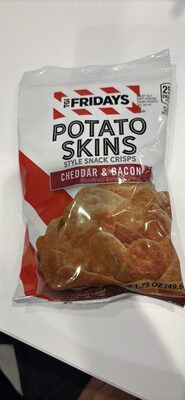
Barcode: 720495902152
POTATO SKINS STYLE SNACK CRISPS CHEDDAR & BACON
DOUBTFUL
📝 Reason: The Halal status cannot be conclusively determined due to uncertain components. Additional manufacturer disclosure is needed for proper Islamic evaluation.
🏷️ Category: N, /, A
📄 Certificates: N, /, A
Ingredients:
Details
Understanding the Halal Status of POTATO SKINS STYLE SNACK CRISPS
The Halal status of food products is crucial for many consumers, particularly those observing Islamic dietary laws. The POTATO SKINS STYLE SNACK CRISPS CHEDDAR & BACON have been labeled as ‘Doubtful’ regarding their Halal status. This uncertainty primarily stems from certain ingredients whose sources remain undisclosed. In this post, we will delve into the details of this snack, examining its ingredients and the associated Halal considerations.
What Makes a Product Halal?
For a product to be deemed Halal, it must not contain any Haram (forbidden) components, and all processes involved in manufacturing need to adhere to Islamic guidelines. When consuming products like the POTATO SKINS STYLE SNACK CRISPS, it is essential that the consumer is informed about each ingredient and its origin.
Ingredients Breakdown
Let’s explore the ingredients of the POTATO SKINS STYLE SNACK CRISPS in detail:
- Potato Flakes: Permissible in Islam.
- Potato Starch: A starchy tuber and versatile in cooking, also permissible.
- Soybean Oil: Generally accepted in Halal diets.
- Sunflower Oil: Also considered Halal.
- Whole Grain Corn: Halal unless processed with Haram additives.
- Tapioca Starch: Permissible for consumption.
- Enriched Corn Meal (Degermed Yellow Corn): Consumed Halal unless processed with undesirable substances.
- Ferrous Sulfate, Niacin, Thiamine Mononitrate, Riboflavin, and Folic Acid: All these vitamins and minerals are permissible.
- Salt: Generally accepted in Halal diets.
- Maltodextrin: Permissible for consumption.
- Sugar: Considered Halal.
- Potassium Chloride (E508): Salts and related compounds that are permissible.
- Caramel Color: A colorant that is typically Halal.
- Monosodium Glutamate: Usually accepted, but potential concerns exist regarding production processes.
- Cheese Powder (Cheddar Cheese): This includes pasteurized milk and is typically permissible.
- Whey: Considered Halal.
- Disodium Phosphate: Accepted in Halal diets.
- Yellow #5 and Yellow #6: Color additives that are generally Halal.
- Dextrose: Permissible.
- Buttermilk: Generally accepted if sourced correctly.
- Citric Acid (E330): Permissible and commonly used.
- Natural and Artificial Flavors (Including Smoke): This is where uncertainty arises; their Halal status can’t be guaranteed.
- Sour Cream & Nonfat Milk: All determinations of these ingredients indicate that they are permissible.
- Tocopherols: Accepted in Halal diets.
- Ascorbyl Palmitate (E304): Often raises questions due to its processing.
- Malic Acid (E296): Typically permissible.
- Yeast Extract: Permissible unless processed under Haram conditions.
- Lactic Acid (E270): This can be Doubtful depending on the manufacturing process.
- Dried Onion & Disodium Inosinate/Guanylate: Generally considered Halal.
- Yellow #6 Lake: Acceptable in Halal diets.
- Silicon Dioxide (Processing Aid): Allowed.
- Contains: Milk: Permissible in Islam.
Conclusion
In conclusion, while many ingredients in POTATO SKINS STYLE SNACK CRISPS are deemed Halal, the presence of certain ingredients such as unspecified natural and artificial flavors creates uncertainty around its Halal status. Therefore, it would be advisable for consumers seeking Halal snacks to look for brands that provide full transparency and Halal certification. Always consult with the manufacturer regarding the sourcing and processing methods for clarity on Halal compliance.
